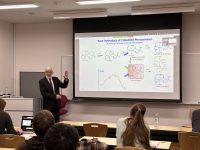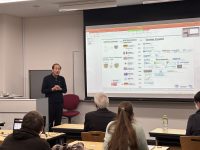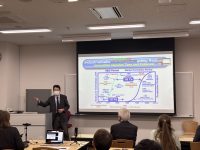After two years and nine months of the pandemic, the German-Japanese Joint Lecture is back.
The lecture series has been jointly held since 2016 by Heidelberg University Office, Kyoto and us. Our main objective with this event is to disseminate research collaboration between the two universities.
For the memorable reopening after almost three years, we welcomed Senior professor Peter Comba from the Institute of Inorganic Chemistry, Heidelberg University, on the topic “Curiosity-Driven Fundamental Science, Innovation and Transfer: Examples from Metal Ion Based Chemistry” to reopen the joint lecture.
This was also the first time that it was held in hybrid form from Kyoto.
Professor Comba emphasized the importance of basic science, using field of inorganic chemistry, in which he has been working on for many years, as an example. To do this he presented us chemical structure formulae from his work and what was archived with them. He also stated that basic science is a culture and its cultural mission is to create knowledge. In this regard, success of basic science depends on asking the right questions and it takes creativity, knowledge and perseverance to find the answers.
He concluded that society gives the resources that enable basic science. Because of this, science must share this knowledge with society. It is the duty of researchers to use their findings and help to solve severe global problems.
In response, the first commentator, Special Professor Susumu Kitagawa, said, “When I was a student, I was told that organic chemistry was the future, but today’s presentation made me realize anew the important function of inorganic chemistry” and that “motivation is important for research, but so is perseverance”. There are currently 27 Start-up companies around the world using the porous materials developed by Professor Kitagawa. However, there are many difficulties involved in commercializing them, and it has taken about a quarter of a century from the initial discovery to their practical application.
The second commentator, Professor Hiroshi Kitagawa, stated that innovation requires time and patience. He also referred to the different role actors play in the innovation process: basic research’s part is carried out by universities as is the industrial by companies. The applied research and technological development in between are carried out in collaboration between universities and industry. However, getting from zero to one, which is the beginning of basic research, can only be born from the dreams and imagination of researchers. He concluded with the words: “Creation is born with dreams, pursued with passion, and crystallized with a sense of mission for society”.
An audience member commented: “When professors can show the inspiration and excitement about science, it really helps students to develop their individual mind and follow their own path.”
 |
  |
Further information on the lecture and the program can be found here.


